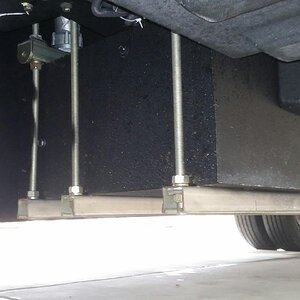Gizmo
RVF VIP
- Joined
- Nov 19, 2019
- Messages
- 484
- Location
- Kansas
- RV Year
- 2017
- RV Make
- Newmar
- RV Model
- Ventana LE
- RV Length
- 40
- TOW/TOAD
- 2020 Jeep Rubicon
Pencil weighing is fine but it can really far off. A 10,000 trailer could have a 10% tongue or 1000 pounds or like my Airstream, that same 10,000 pounds RV could have a 1700 pound tongue weight. That difference of needing a 1/2 ton with 2 1/2 hitch to need at least a 3/4 ton and need a minimum of 3" hitch which by the way hard to find. I just weighted my Class A yesterday and to my surprise, my UVW is 30,279 and I weighed in at 33,240 or 2,961 pounds of stuff in RV, and if guess I would have said less than 2,000 pounds. The GVWR is 37,500 so not a problem yet but it seems to gain every year.











